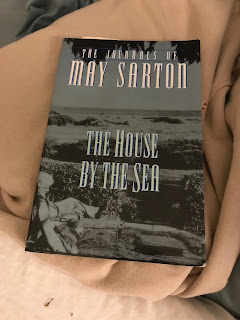 |
| Nellie Olsen and The Round House photo by me |
"In order to purify yourself, you have to understand yourself, Father Travis went on. Everything out in the world is also in you. Good, bad, evil, perfection, death, everything. So we study our souls."
One would think with all the rain we've had this Spring here in Piedmont NC, I would have finished reading more than one adult book in the last month. Not so much, and honestly, I have no freaking clue what I've been doing, certainly not mowing my lawn or cleaning my house. Anyway, today I read the last page of The Round House by Louise Erdrich. This was my first Erdrich novel, although a friend recommended and lent me The Master Butchers Singing Club, which I started but had to abandon because I couldn't read the font. I love getting old.
Describing The Round House is not easy. It is a mystery, a coming-of-age story, and historical fiction all rolled into one character and plot-driven novel. I loved the narrator's voice; it reminded me of the John Boy Walton voice-overs at the end of every Waltons episode. And while I found the Native belief-system stories and mythological histories interesting, sometimes they interrupted the plot flow and felt artificially inserted for only the purpose of disseminating them. The plot points bringing to light the common-place and unpunished abuses of Native women and the purposefully convoluted, specious court system that is Native law were infuriating. And at the same time, the escapades of the teen boys at the center of the plot, while sometimes crude and a bit over-the-top, were also often very funny. I certainly did not see where the plot was going and am still a bit unnerved by it, but I'm glad I read the book and plan to read more of her work in the future.
Erdrich nails the deep, often hidden and hard to name parts of human nature in the quotidian evil of the Larks, the Atticus Finch-like honor of Joe's judge father, the Native-hating governor who surreptitiously and immorally impregnates a Native girl, and in the searching, unorthodox compassion of Father Travis. She covers huge moral questions like the problem of pain and its partial answer of free will, the question of how much we are or are not our brother's keeper, as well as the central conflict of vengeance versus justice and how far we can go to right wrongs without destroying ourselves in the process. This book gave me a lot to ponder, and I'm sure as soon as I post this, I'll think of something else I'd like to say. In the meantime, happy reading to you all. I'm headed back to Italy to finish Beautiful Ruins.



